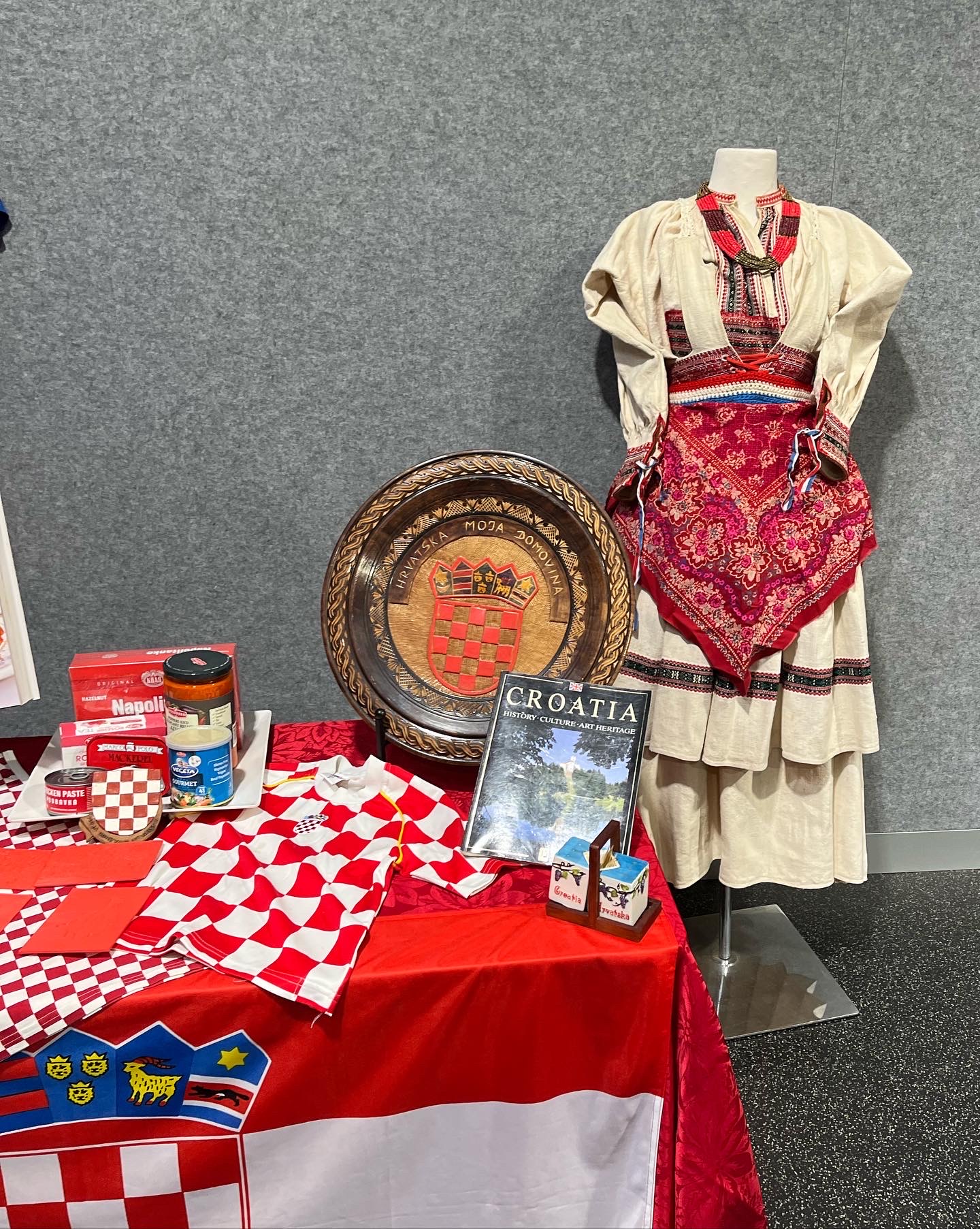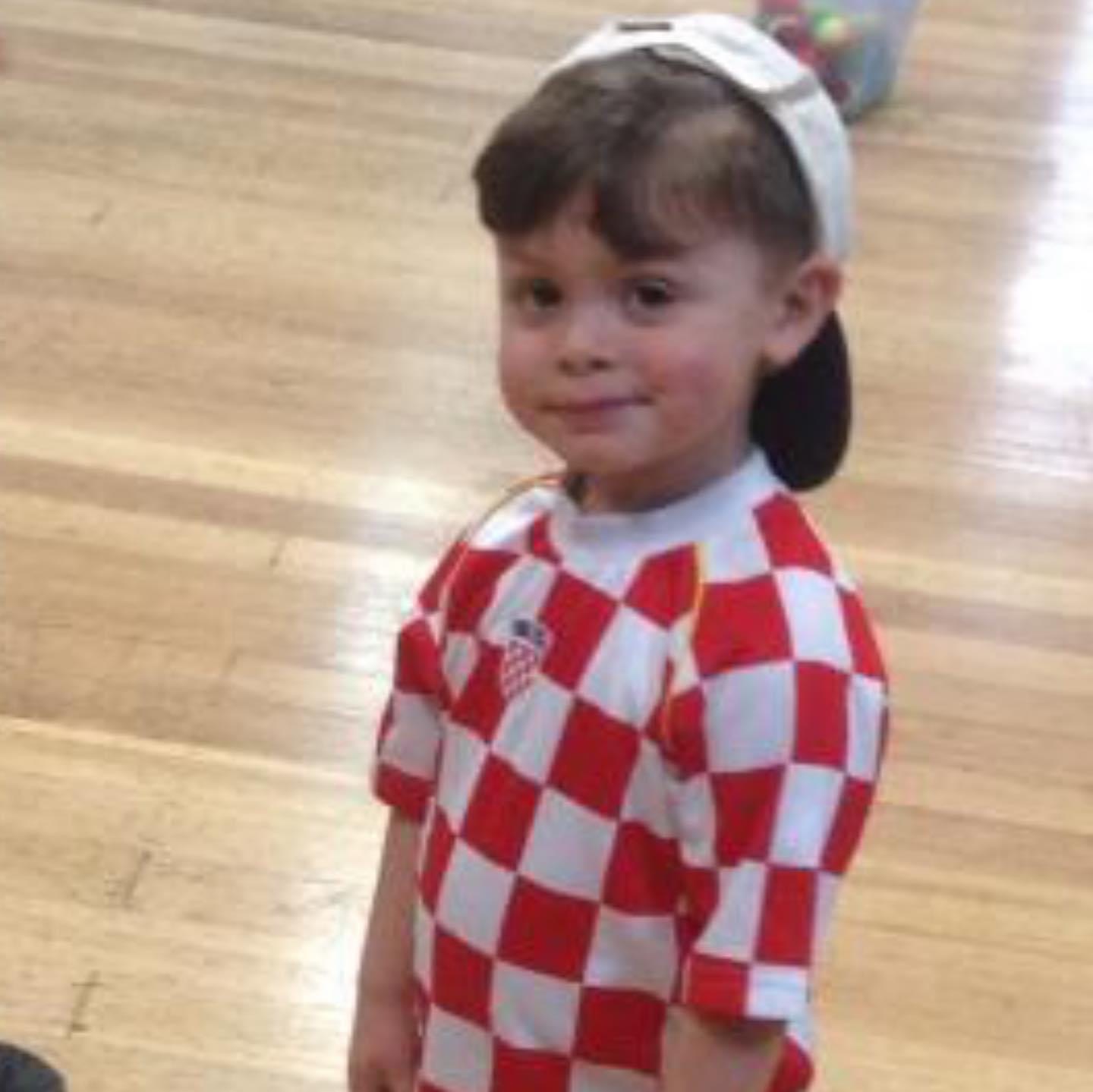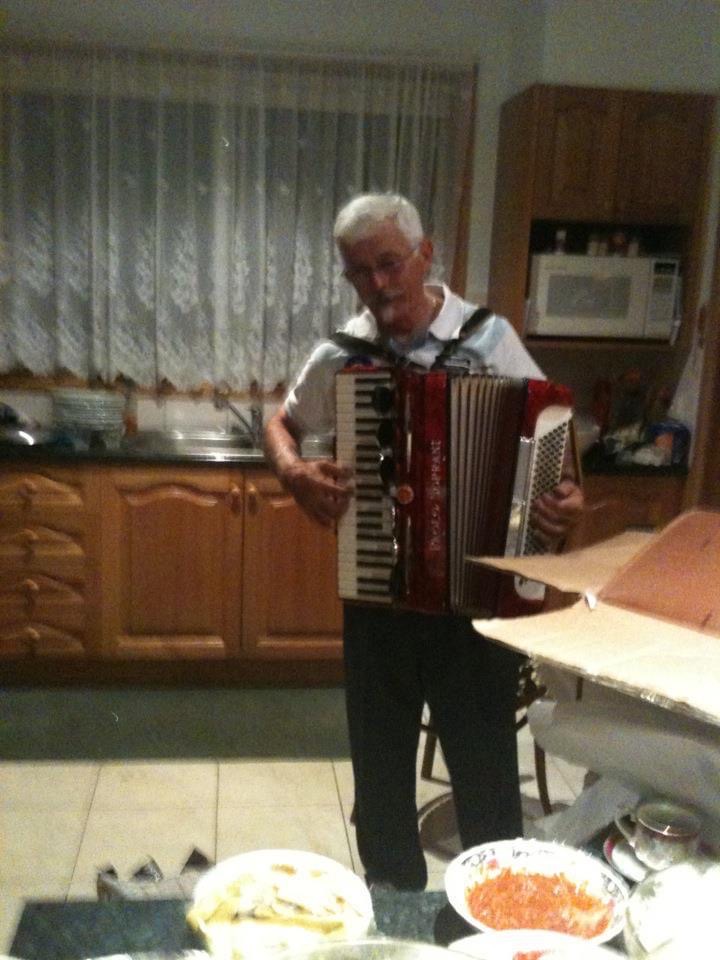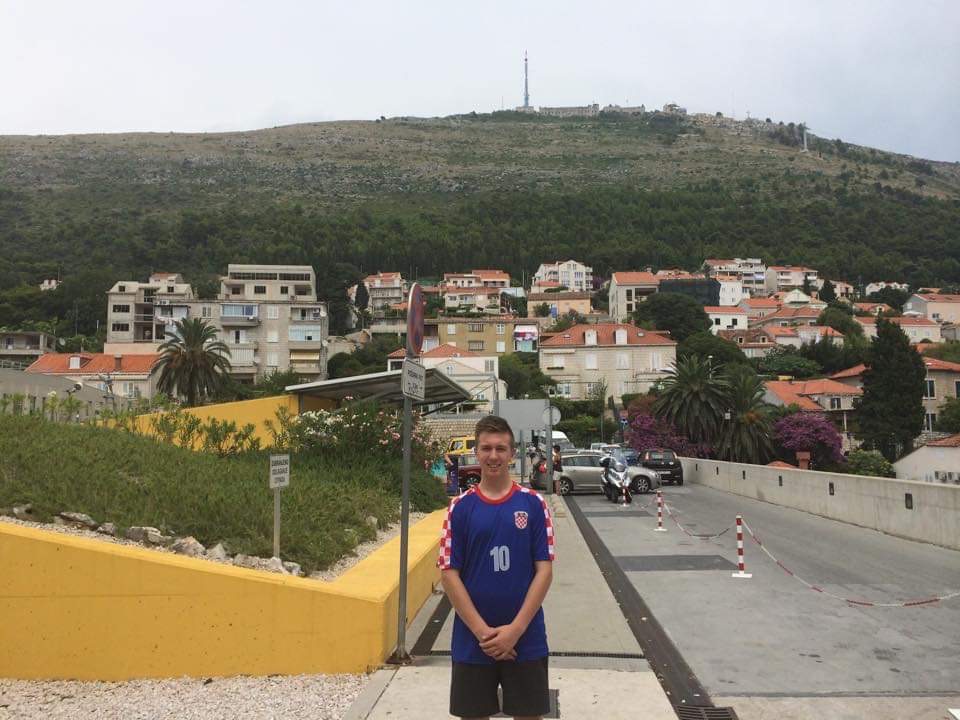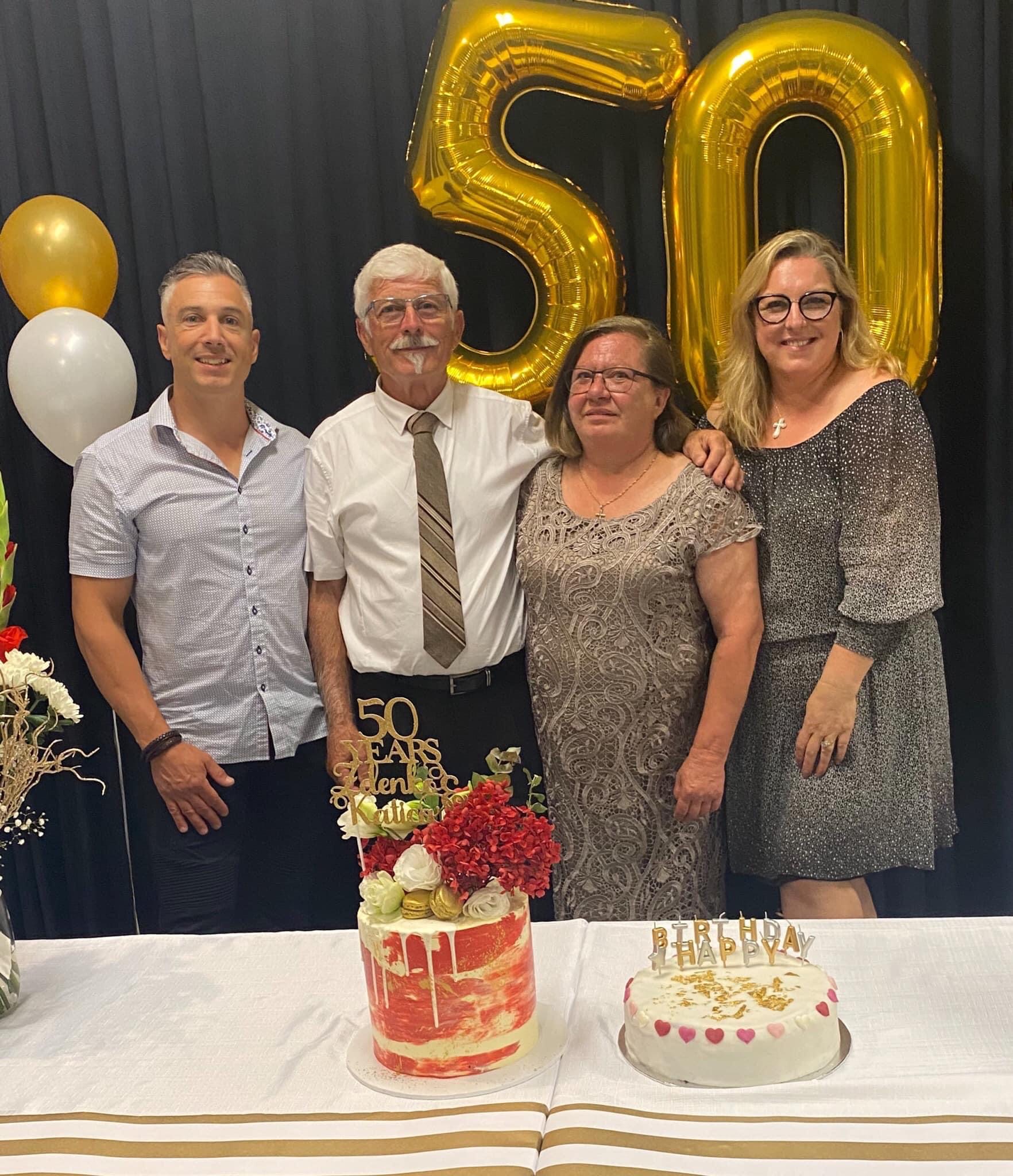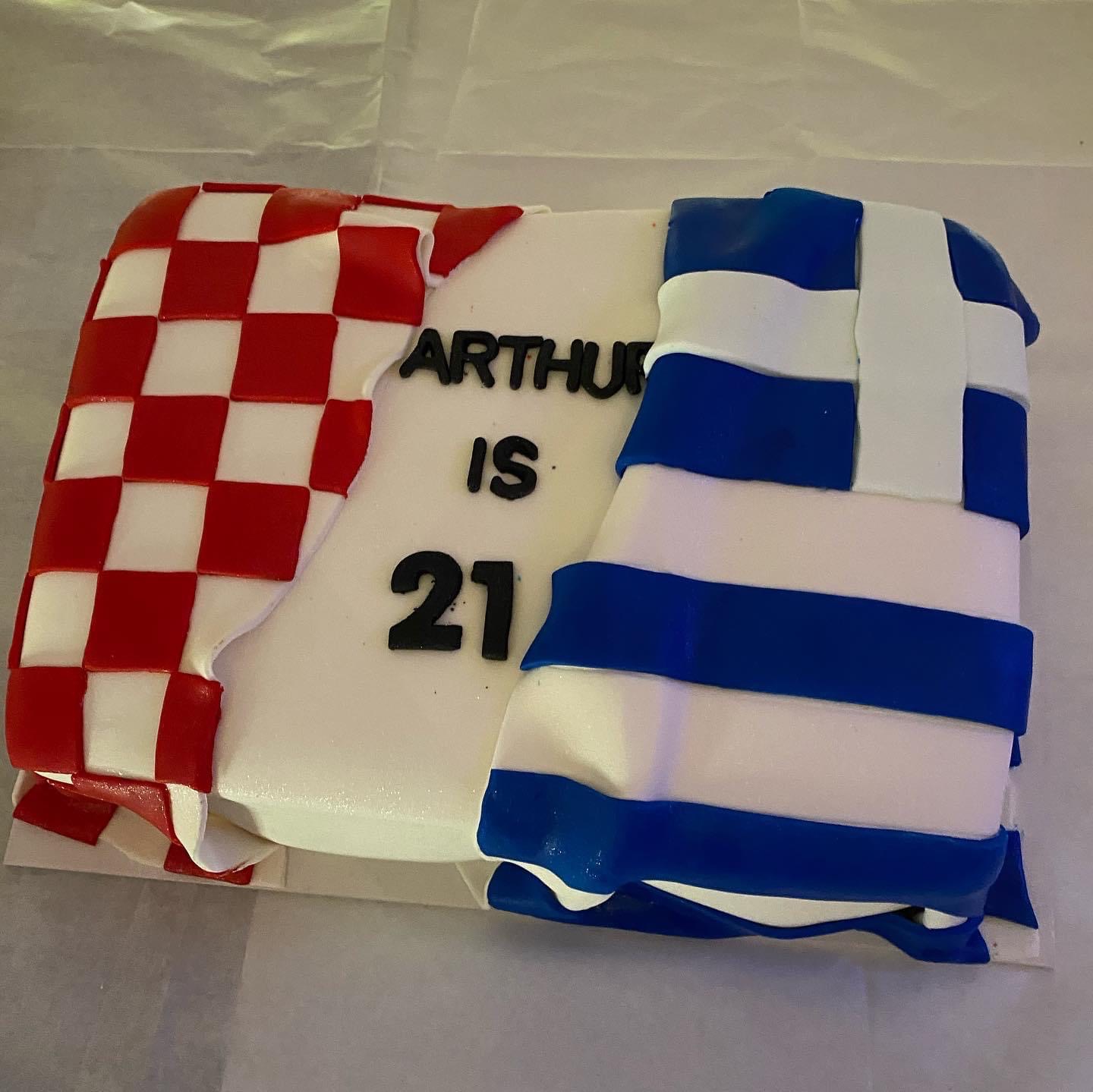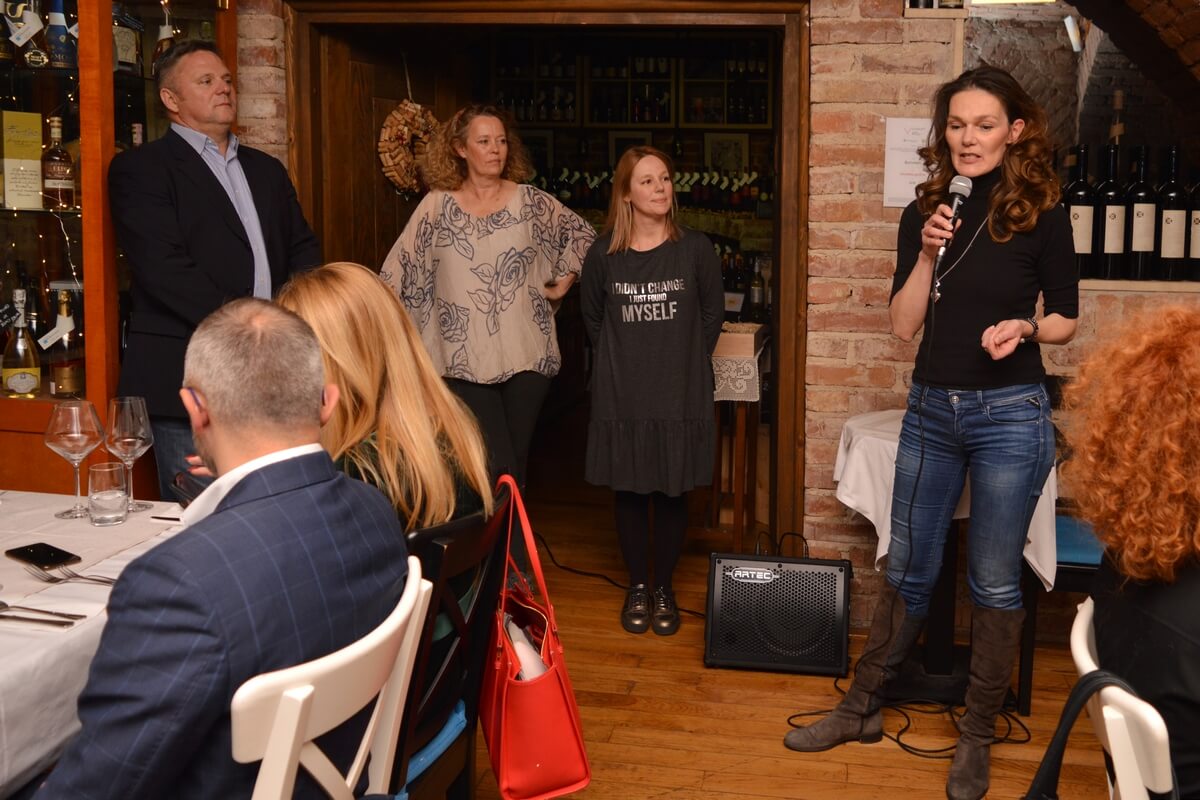Australian-Croatian Boy Wins School Project with Croatia Presentation
July 2, 2022 - An 11-year-old Australian-Croatian boy won first place in a Travel Expo school project by presenting Croatian history, culture, traditions, and folklore to his teachers and classmates. TCN had the privilege to talk with his mother, Irena, about their Croatian ancestry.
Arkie Kokoris, an 11-year-old boy from Melbourne, Australia, won first place in a Travel Expo school project, which consisted of presenting information about a country, where he and his 2 colleagues chose Croatia due to his families ties. They were tasked with presenting a Travel Expo stand, encouraging people to visit their chosen country, and were asked to provide information on the natural attractions, climate, tourist destinations, cuisine, culture, history, wildlife, and more.
Arkie's presentation included local products, flags, shirts, traditional costumes, and more. (Photo: Irena Kokoris)
Arkie attends a private Christian school and he’s currently in year six. He included some fact sheets about Croatia and a hand-drawn map which they placed on the wall and a slideshow presentation on interesting facts and the history and culture of Croatia. They included historical buildings and landmarks, nature parks, food, and animals. For the visual display, they included the flag, various souvenirs from Croatia, traditional food items, some sporting memorabilia including a soccer jersey from Dinamo, an authentic Croatian costume from Zagreb, a cookbook, and another book on famous landmarks and buildings in Croatia. One of the students has a 3D printer and made lithographs of famous buildings which would be placed in front of a torch to show the image.
A smaller Arkie with a Croatian football shirt. (Photo: Irena Kokoris)
His presentation obtained first place after a voting process, and a humble first prize of a certificate and a round of applause followed. His fellow classmates had to vote on their favourite display and Croatia won by a landslide.
Total Croatia News interviewed his mother, Irena Kokoris, who, in addition to being great support of her son in the process of designing and executing the project, proudly shared the achievement on social media. Irena’s heritage story is, perhaps, one of the most interesting and touching I’ve read, and I’m really glad that you can learn from it through her own words.
My parents are from the region of Zumberak, Karlovac. They grew up on farms, tending to animals and the land as well as attending school and doing their homework by candlelight. They left in 1971 for Australia as a young and newly married couple, hoping to start a new life together with opportunities for their future children. Upon arrival, they were met by only one relative.
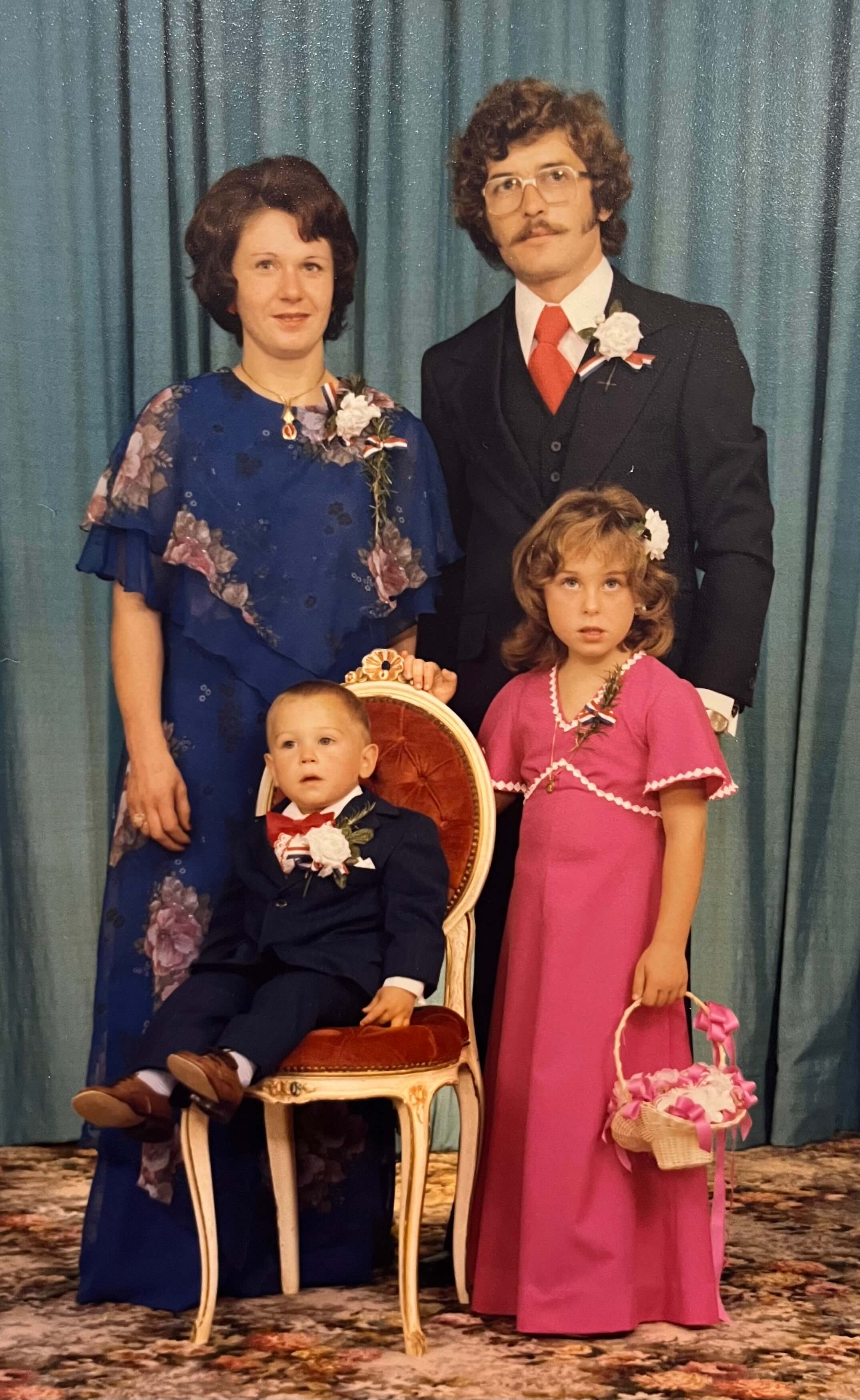
Irena with her father Zdenko Rados, her mother Katica Rados, and her younger brother, Marko. (Family album)
They spent some time in an immigration camp before finding rental accommodation and finding work. They both worked full-time jobs their whole working lives, as well as raising 2 children. They have 6 grandchildren. My father passed away suddenly last year at the age of 69 leaving a large hole in our family. My mother made sure to include the grb on his gravestone, he was a very proud Croat.
Irena's father, Zdenko. (Family album)
What kind of Croatian traditions and customs did you have at home when growing up? Were there Croatian recipes and food as well?
We always celebrated the Catholic holidays with the family, having a pig cooked on the spit, lots of sides, and lots of beer and wine. My parents had many family and friends of Croatian heritage and we always had some kind of gathering to attend on the weekends. Dinner dances, weddings, holy communion or confirmation, birthdays, etc. Mum taught me how to make sarma, gulas, cevapi, kiseli kupus, as well as many other traditional foods. There would be sunka, slanina, kobasice, wine, and sometimes rakija as the seasons allowed.
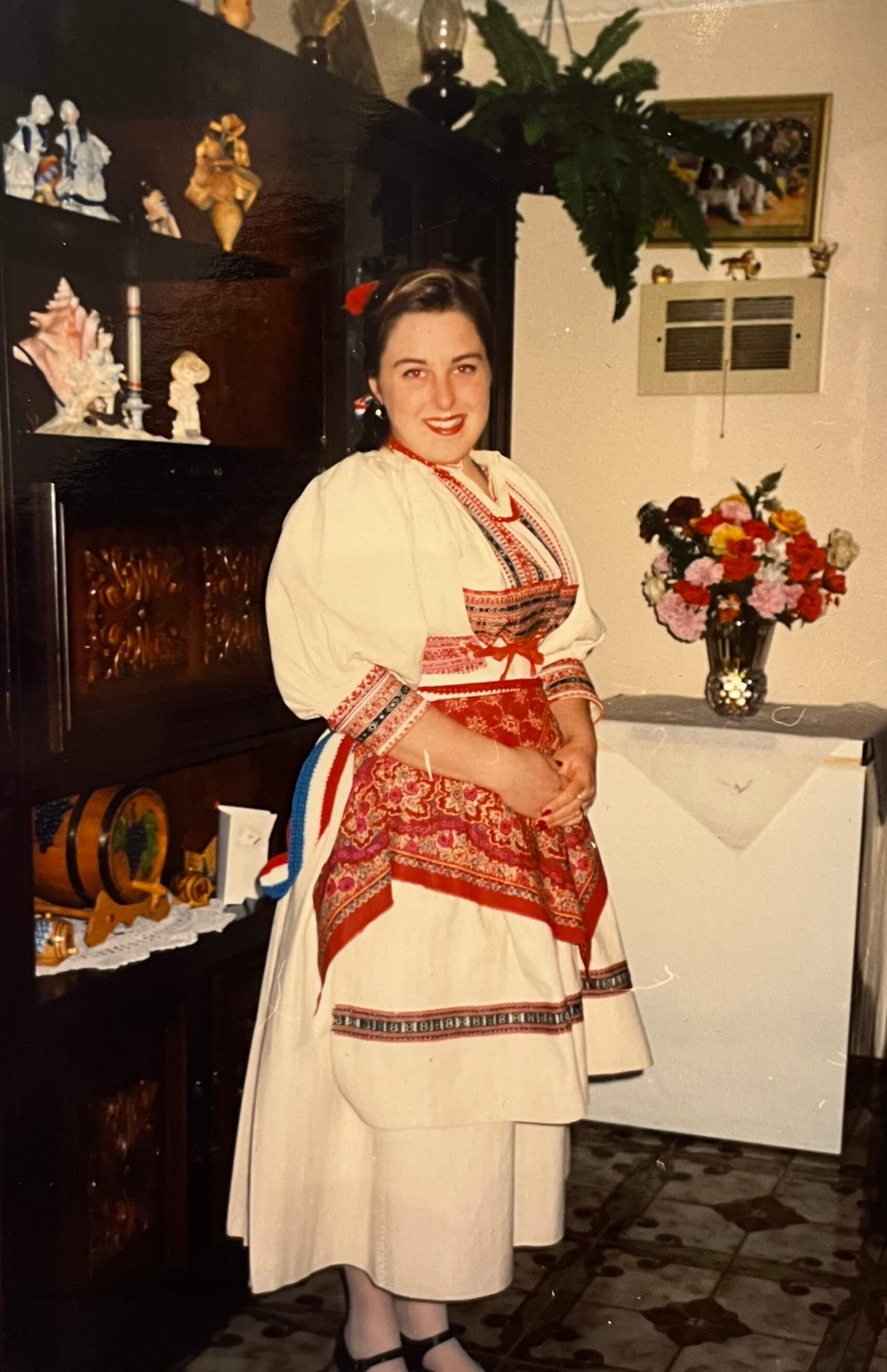
Irena with a Croatian traditional costume. (Family album)
Was there a Croatian community where you grew up? Have you been a part of it? How?
We’re a part of the Hrvatsko Vinarsko Drustvo, Mladi Hrvati Folklore, the Croatian Golf Club, Croatian Saturday School, our church was Sv Nikola Tavelic, and there were many dinner dances organised by the church as well as New Years Eve parties. I danced for many years, into my early 20s, my brother also attended for a few years. Being part of the dancing group, attending many events was some of the happiest memories of my teenage years. One year (around 1990), a large group of Croatian singers and the President of Croatia Stipe Mesic visited the Melbourne Knights soccer club and we sang the Australian National Anthem and danced for them.
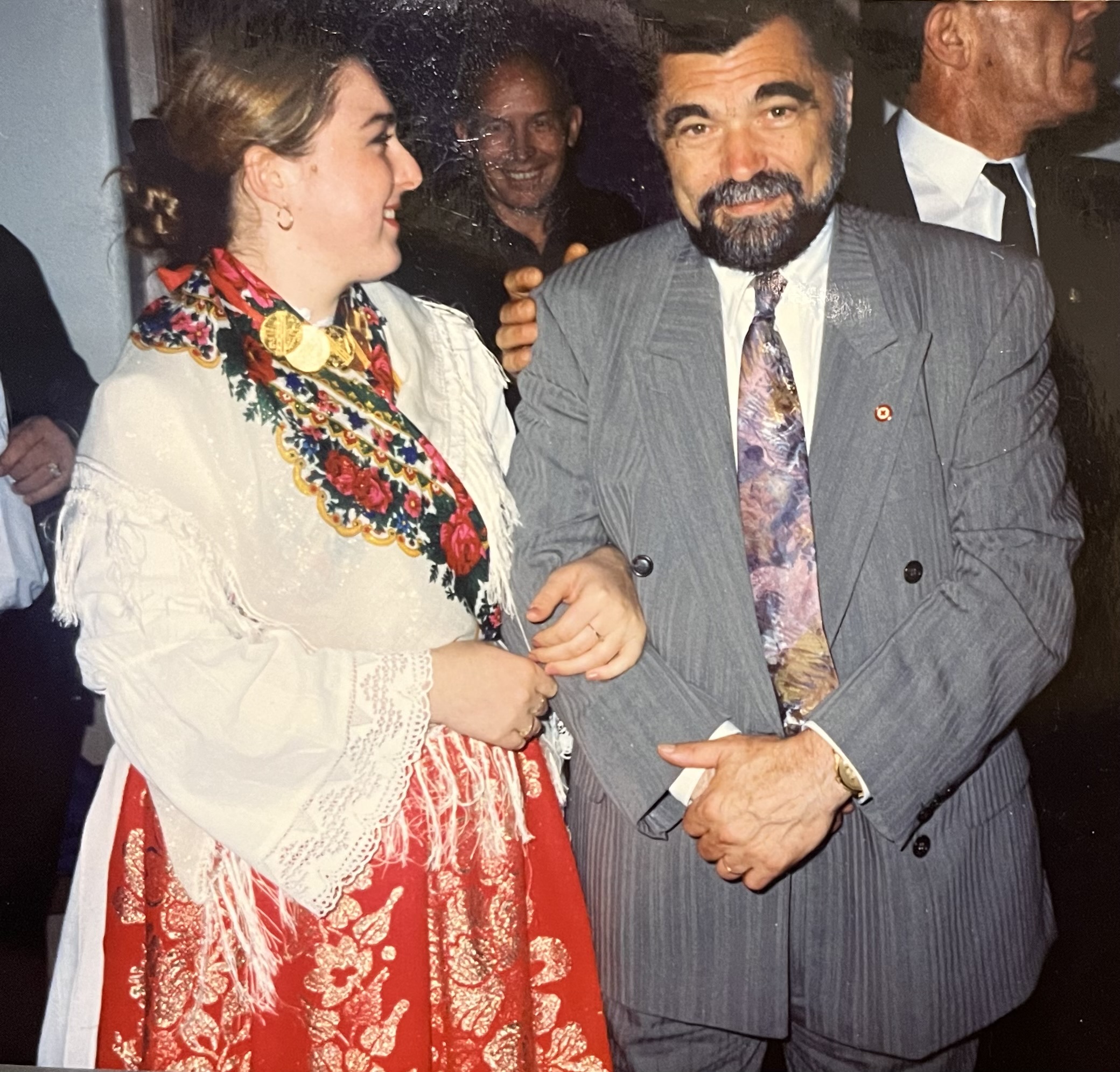
Irena with former Croatian president, Stjepan Mesic. (Family album)
Have you visited Croatia? What was your impression?
Visited in 1985 as a teenager, spent most of the time in the village, but travelled to Slovenia, Rijeka, Zagreb and Karlovac. Visited Plitvice and a few other locations. Spent a lot of time in the forest and on the farm. Picked cherries from the fields and mushrooms from the forest. My parents went back to Croatia in 2014 and took my oldest son Arthur with them for 6 weeks.
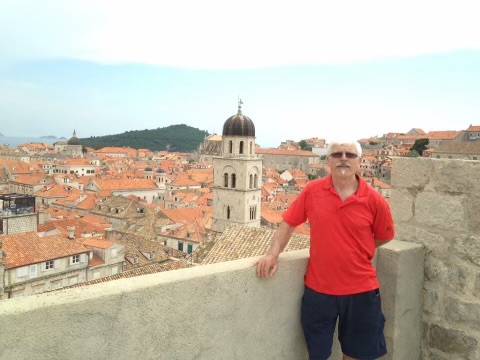
Irena's father Zdenko in 2014 trip to Dubrovnik. (Family album)
They travelled more extensively that time and saw more sights, including Dubrovnik and Split and my son really enjoyed his time there. My dream is to return for a visit and bring my family to see the country of their mother’s heritage. Croatia is such a beautiful country and I feel strong ties. We were planning to go in 2021, but the pandemic changed our plans! My children are old enough now to travel and it is definitely on my bucket list!
Irena's older son, Arthur, went to visit Croatia with his grandparents. (Family album)
What makes your connection to Croatia so strong and special? What is it that you like the most about your Croatian heritage?
Growing up hearing my parents talk about their homeland with such fondness (apart from the hardship). They were mindful to pass on their love and pride in their country to us. We attended Croatian school on Saturdays for many years, learning history, geography and language. I remember our teacher didn’t know any English, so we had to speak Croatian the whole time! Having visited there in 1985 as a young girl, I have such fond memories and loved the land and the carefree attitude of its people.
The Rados family during the 50th year of marriage celebration between Zdenko and Katica. (Family album)
I love that I am of Croatian heritage, I am proud of it and proud that I had the opportunity to participate in the Australian Croatian community for many years in my life. After I married, I became less involved and moved into becoming a mother and wife – of which I am also very proud.
In which ways do you try to teach your children to embrace their Croatian heritage?
I always remind them that despite their surname – they are half Croatian! They have all shown an interest at some stage in learning the language and have picked up a little over the years. They love all the Croatian cuisine – especially the kolace! I involve them in learning some recipes such as punjene paprike, cevapi and raznjici. We have attended a few dinner dances over the years and I think my older two may attend Croktoberfest this year!
Irena's children are of both Greek and Croatian descent. (Family album)
What’s your favorite thing about Croatia?
My favourite thing has got to be the culture around folklore dancing! I think it is beautiful, elegant and regal. The costumes are divine and the music is amazing. I miss dancing so much but am so glad I was a part of it for so long.
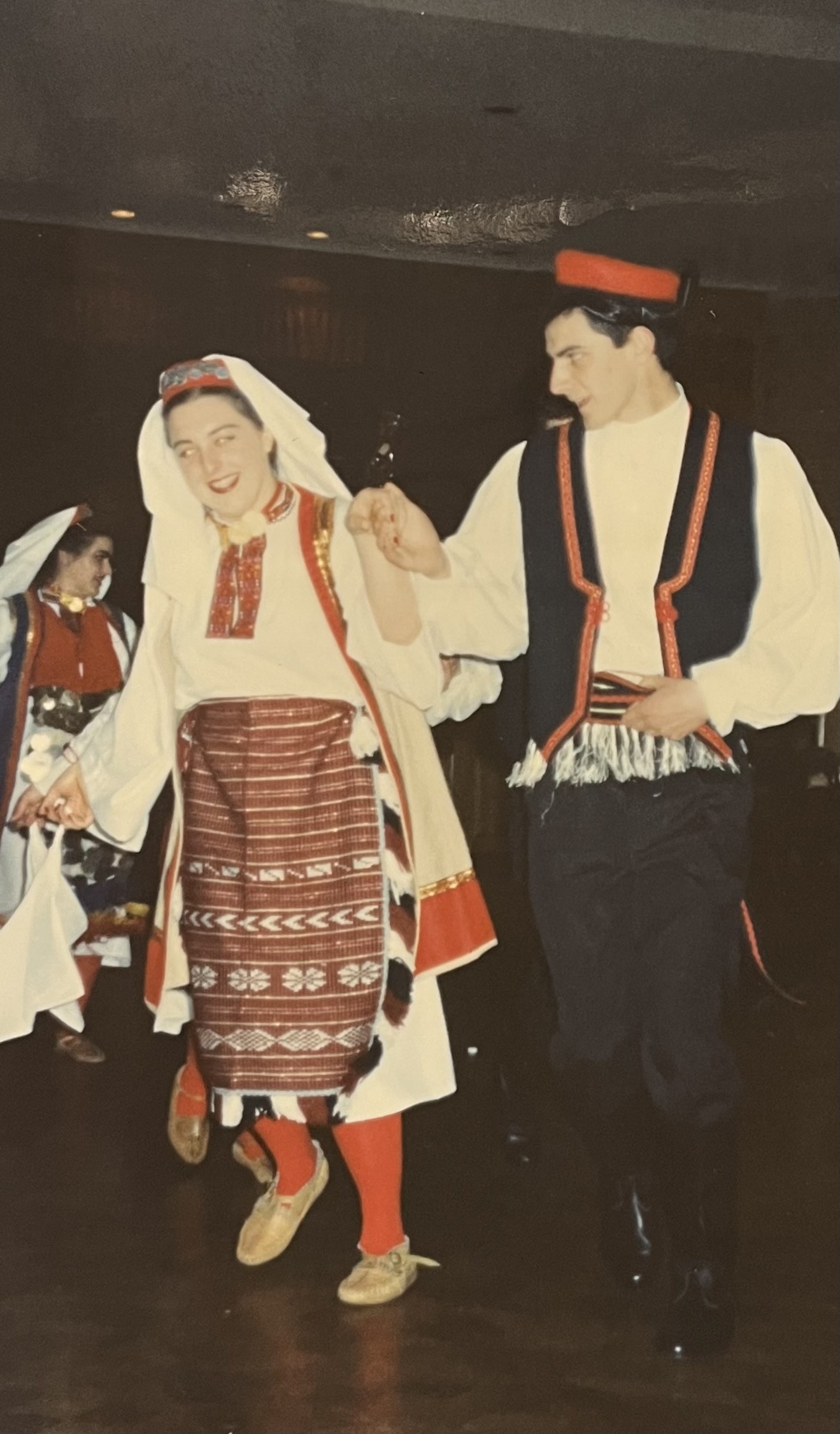
Irena dancing with a friend. (Family album)
Thank you Irena for sharing your story with us!
For more news about the Croatian diaspora, visit our dedicated section.
Toilet Paper Culture: an Australian Viewpoint from Croatia
April 3, 2020 - Australian toilet paper culture made global headlines last month, as fights broke out in supermarkets between people hoarding due to coronavirus. A little Australian insight into the whole toilet paper culture from an Aussie in Croatia.
One of the more interesting reads in recent days on TCN has been the new series called Foreigner Self-Isolating in Croatia: Do You Feel Safer? It looks at the experiences from expats living in Croatia from all over the world, and so far there are contributions from Romania, Germany, Spain, USA, Canada, Mexico, Argentina, India, Hong Kong, UK and Ireland. I decided to contribute my thoughts and sent my answers to Paul, which will be online shortly. But he was delighted to hear from me, for I was the first Australian to answer, which meant I had an extra task. This extra task has turned into the article below.
As an Aussie in Croatia, I got the bonus question about toilet paper, and the heavy task of responding on behalf of my fellow citizens on the topic.
To clarify, I am a dual Australian Croatian national. This means I have enough toilet paper - even alcohol - but being in Croatia, now I don’t have any yeast to make donuts and stuff.
The toilet paper thing puzzles me, too. There is no shortage; it’s ‘an artificial famine’. I have read up academic and anecdotal views to try to understand it. This is a culmination of my findings.
I woke up one morning - 4th March - to see a witty friend post this:
“IF YOU WANT TO KNOW WHO YOUR TRUE FRIENDS ARE, ASK THEM IF YOU CAN COME OVER TO TAKE A SH*T”.

I knew it was going to be a good meme day.
A Lebanese-Australian man’s video about “Australians looking like idiots” went viral. And for good reason. His 84-year-old uncle - who carried him as an infant through war zones - called him from Lebanon to check in. In Australia we all know the overseas relatives never call.
This was serious.
Above: A senior in Australia facing empty shelves - no bread. Senior specific hours and “Basics Boxes” are now being offered due to the stockpiling by panic buyers.
Factor 1: The Fires
To be fair, Australia was just coming out of apocalyptic bushfires. May I repeat: A-PO-CA-LYP-TIC. For those who haven’t been to Australia - or even have - if you were to visit one beach a day in Australia, it would take you 27 YEARS to see them all. It’s a big country. There’s a lot of bush (trees) and it was also the peak of summer. So everyone was on one big beach. Not true - that was Bondi after social distancing was announced. Still. It was hot. Cities were covered in smoke from fires for weeks - the smoke even reached other countries. Australia is an island. Think about that. New terms became mainstream on the news: “megablaze” and “ember attack”. Two - you guessed it - mega blazes, eventually merging between the state of Victoria and New South Wales. This is like all of Poland burning through and coming into Dalmatia. No it’s not, but I’m going for effect. It was mega.
People are still sleeping in tents.
My family were among the many stuck for days on holiday coastal towns with red skies, people and horses seeking safety on beaches, roads closed. At times, there was no water supply. Power would go out. A drive which took 2-3 hours took 2-3 times that - if the road didn’t get blocked by falling, flaming trees. Lives, wildlife and livelihoods were lost.
This, clearly, disrupted supply chains and business sectors, particularly tourism. So the panic buying isn’t a total surprise, given the timing. What is surprising is going from the solidarity and care shown around the fires to communities in these burnt out places - to now all-out supermarket brawls.
A sense of fear and lack is looming with COVID19.
Australia has never faced a significant physical threat (natural disasters aside). Toilet paper has become a symbol of control in an uncertain time.
Factor 2: Status, Culture and Control
I could harp on about how relative status is here - but Seth Godin does it better, so I won’t. What needs to be considered is Australia is dubbed The Lucky Country. Anyone - people who don’t even speak the language, can come to Australia and thrive through hard work and fair dinkum-ness. Sure, a lot has changed. The living ain’t cheap. As such, many living standards are high. Toilet paper can be classed as a symbol of this status everyone is working so hard for - if you deprive someone of that, you’re depriving them of their hard work.
Just to note, compared to Europe, nobody - nobody charges you to use a public toilet. It’s just a given - which is what Aussies expect, subconsciously, about the toilet-going experience. Enough toilet paper is thus seen as a ‘right’ vs a privilege.
Toilets are also immortalised in film and song. One of the most popular Australian-made films is ‘Kenny’ - a mockumentary about a plumber guy and the portable toilet industry. And one of the most famous country singers, Slim Dusty, gives an ode to the dunny with his song Redback on the Toilet Seat.
We know going to the loo can be dangerous, but it doesn’t need to be. Toilet paper is part of that safety.
Factor 3: Spiders and Supermarkets.
What is strange is Australia is a country where everything can kill you, and we still walk around barefoot. The sun, the sea (rips), sharks, spiders, snakes - yet we go along our merry way at ease living with these threats. Take our toilet paper away, and we (some) become monsters.
A friend in an affluent suburb reported their small supermarket had plenty of toilet paper. Even in the peak of panic-buying! This could be related to socio-economics and more shoppers at one time in suburban centres. Also, it does take up a lot of room on the shelves, so when it disappears, you notice.
The scenes we’re seeing - of fighting in supermarkets, is, unfortunately, a response to the fear and sense of lack many feel right now.
There is plenty of toilet paper in Australia. It just gets bought up by a certain type of consumer.
The best response I found was chef Adam Liaw who is always articulate and hilarious:
“If you are one of the people who has panic-bought a 6-month supply of toilet paper I think you should go home and look at your enormous pile of toilet paper and think about what you’ve done.
That, and:
Just imagine if, after everything, you finally went out for dinner to a Chinese restaurant and ended up getting coronavirus from Tom bloody Hanks.
I’ll leave it there.
EU-Australia Free Trade Agreement Could Benefit Croatian Companies
As Poslovni Dnevnik/Ana Blaskovic writes on the 16th of December, 2019, in addition to traditional topics such as customs and market access, this should be a new generation agreement as it will also address regulatory issues, barriers and more with a significant impact on trade and investment. Just how much could the EU-Australia free trade agreement benefit Croatian companies?
The Free Trade Agreement, which has plagued the European Union and Australia for the past eighteen months, and could take a year to open, also opens up the opportunity for Croatian companies to step into the large, and hitherto poorly explored, Australian market, which has been continuously recording positive growth rates for the last thirty years. As Croatia formally takes over the rotation of the EU presidency in a mere fifteen days, an Australian mission was staying in Zagreb last week, talking with the Croatian Government and various business representatives about the new agreement.
''The importance of a this agreement which provides business security is that Australian companies, much like others, go wherever the opportunity is. The competition is huge, if opportunities exist and trade is not facilitated, then they will go and look for other potential opportunities elsewhere, where it may be easier, where it's easier to negotiate, where the market may be familiar,'' said Australia's Ambassador to Croatia, Elizabeth Petrovic.
''Almost every Croatian company that has built a successful export model could find a good market for their products in Australia, whether they're in agriculture, construction, logistics, or the pharmaceutical industry. European companies are present in all these sectors in Australia and there are certainly plenty of opportunities for Croatian companies, but many have not explored this market, and many Australian companies have not done so in Croatia either,'' says Jason Collins, Director of the European Australian Business Council in Sydney.
He adds that Australia has very few barriers to business, such as customs, as a result of the reforms, but also says that there are more companies investing in the EU and they're keen to discuss opportunities to come and invest in Croatia.
Despite a diaspora of about 200,000 expatriates from Croatia and their descendants, of the 55 billion dollar annual exchange between Australia and the EU, Croatia contributes a negligible 23.8 million dollars, and Croatian companies such as Podravka and Mlinar remain exceptions. A free trade agreement could open the door to stronger ties, which, with five rounds of talks in a year and a half, is extremely fast for Brussels.
The reasons for this are to be sought in the US-China trade war, which are leading trading partners to both sides in these negotiations.
"The EU's and Australia's main trading partners are going through some tough times, trade is insecure, it can't be taken for granted anymore based on rules," says Juliana Nam of the Australian and EU Mission to Australia.
Australia has concluded eleven trade agreements with countries in the Asia-Pacific over the last fifteen years and today 68 percent of trade is facilitated through preferential arrangements. If it successfully completes negotiations with the EU, that figure will reach 80 percent. The negotiations, however, are entering a phase where more difficult issues are raised, such as EU barriers to agricultural products, customs on EU industrial goods that directly affect the European automotive industry, and also the issue of protection of geographical origin.
"These are difficult areas for us, but we're pragmatic and we want the negotiations to move forward," Nam stated.
It is worth noting that of the total trade value of the EU and Australia, almost half is made up by services. Although Australia is relatively small in population of just 25 million, it is the thirteenth largest economy in the world and this coule represent an exciting opportunity for Croatian companies wanting to broaden their horizons.
Make sure to follow our dedicated business page for much more.
EU-Australia Free Trade Agreement a Chance for Croatia
ZAGREB, December 9, 2019 - The free trade agreement between the European Union and Australia is a chance to develop Croatian-Australian economic relations, a panel discussion was told at the Croatian Chamber of Commerce (HGK) on Monday.
"Trade between the EU and Australia is about 55 billion dollars and Croatia participates with 23.8 million dollars. We cannot be satisfied with it, even though most of it relates to our exports to Australia. That's why we see the EU-Australia free trade agreement as an additional impetus to our bilateral relations," HGK Vice-President for Industry and Energy Tomislav Radoš said.
He said that there was a growing interest among Croatian companies in the Australian market and that some companies, such as food maker Podravka and Mlinar bakery, had already found their place there.
"Australia is known as an open and innovative economy and small companies with good products and ideas can find their place there. Energy, industry, technological development and tourism are the areas with great potential to increase cooperation," Radoš said, noting that the HGK had been working for years to strengthen economic ties between Croatia and Australia.
Negotiations on the EU-Australia free trade agreement began in May 2018 and five rounds of talks have been held since.
Marko Marić, chairman of the HGK Business Council for Economic Cooperation with Australia, said that the Council's main task was to strengthen ties and enable exchanges of experience between businesses from the two countries.
"Over 200,000 members of the Croatian diaspora live in Australia and they play an important role in its economic life. This can help Croatian companies enter the Australian market," Marić said.
Australia's Ambassador to Croatia, Elizabeth Petrović, said that the Council was very important in developing Croatian-Australian economic relations, as a source of information for Croatian businesses wishing to export to Australia and vice versa.
We want to establish an economic system based on free trade and transparency that will strengthen our economies and further boost trade, both with the EU and with Croatia, Petrović said.
Juliana Nam, economic adviser and special negotiator on the Australia-EU free trade agreement at the Australian mission to the EU and NATO, said that the agreement would be a major step forward for both sides.
Croatia is naturally oriented towards European countries as its main trading partners, but it is important that it diversifies its economy, and one of the ideal destinations for that is Australia, Nam said, adding that in her country there is great demand for high-quality services and that this is a chance for Croatia.
More news about relations between Croatia and Australia can be found in the Politics section.
Australia Meets Croatia at Bornstein Wine Bar
On Wednesday, May 8, the legendary Bornstein wine shop and wine bar at the Kaptol in Zagreb was the venue for a special “meeting” between Croatia and Australia at a gala dinner “Australia meets Croatia”, a part of the G’Day in May project – the typical Australian abbreviation for “hello” or “good day”. The dinner and wine pairing at Bornstein was organised together by the Embassy of Australia, the Bornstein wine shop and wine bar, and the dynamic Women On Wine association from Croatia. The name of the project illustrated the fact that the evening would be relaxed and not very formal, regardless of the fact it was attended by H.E. Elisabeth Petrovich, the ambassador of Australia.
Australian wines were paired with Croatian food and vice versa, and the evening began and ended with exceptional wines from one of Australia’s oldest wineries, D’Arenberg (1912), from the world-renowned and well-known wine region of McLaren Vale from the very south of the Australian continent. It is a Mediterranean-like climate area, so the wines are expressive, with pronounced aromas, and the winery is renowned, in addition to its excellent wines, for the unusual names it gives to its wine labels.
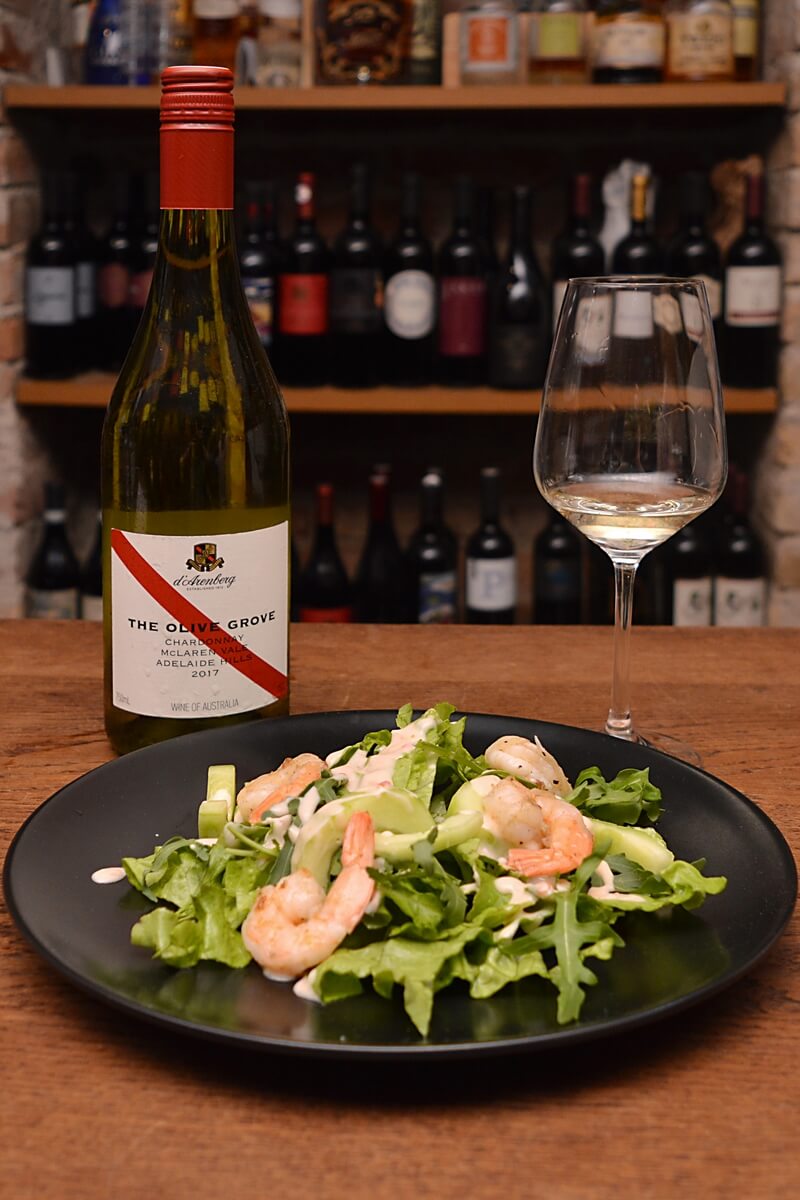
The first wine, The Olive Grove Chardonnay 2017, is a wine of dramatic fruitiness (peach, melon, quince), creaminess and, unusually for Chardonnay, spicy aroma in the aftertaste. It was nicely paired with the grilled mini shrimps on cutting lettuce prepared by Bornstein. About 50 guests returned to the Mediterranean, but the real Croatian one this time, thanks to Jo Ahearne, a London-born who began building her wine career in Australia and several years ago moved to Hvar to become a wine producer there. Jo Ahearne is the only woman in Croatia holding the Master of Wine title, and there are fewer than 150 such masters in the world.
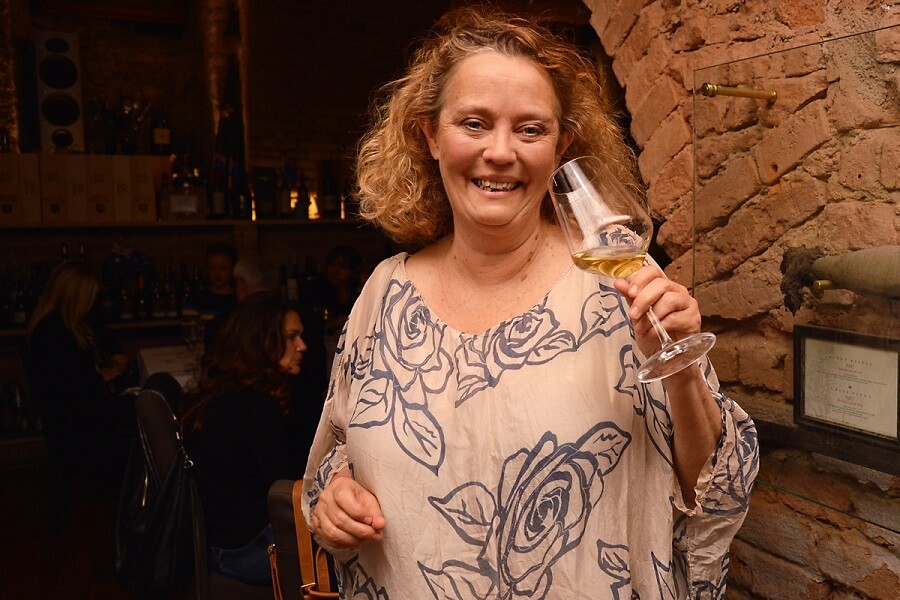
Ahearne presented two of her wines – Wild Skins and Plavac Mali. Wild Skins is a blend of three autochthonous Dalmatian white varieties – Bogdanuša, Kuč and Pošip – a great wine whose structure is similar to the structure of macerated white wines with quince aromas and the notes of honey and spice herbs. The rabbit ragu with gnocchi was an excellent pairing for this wine, created by the FinoVino restaurant culinary team.
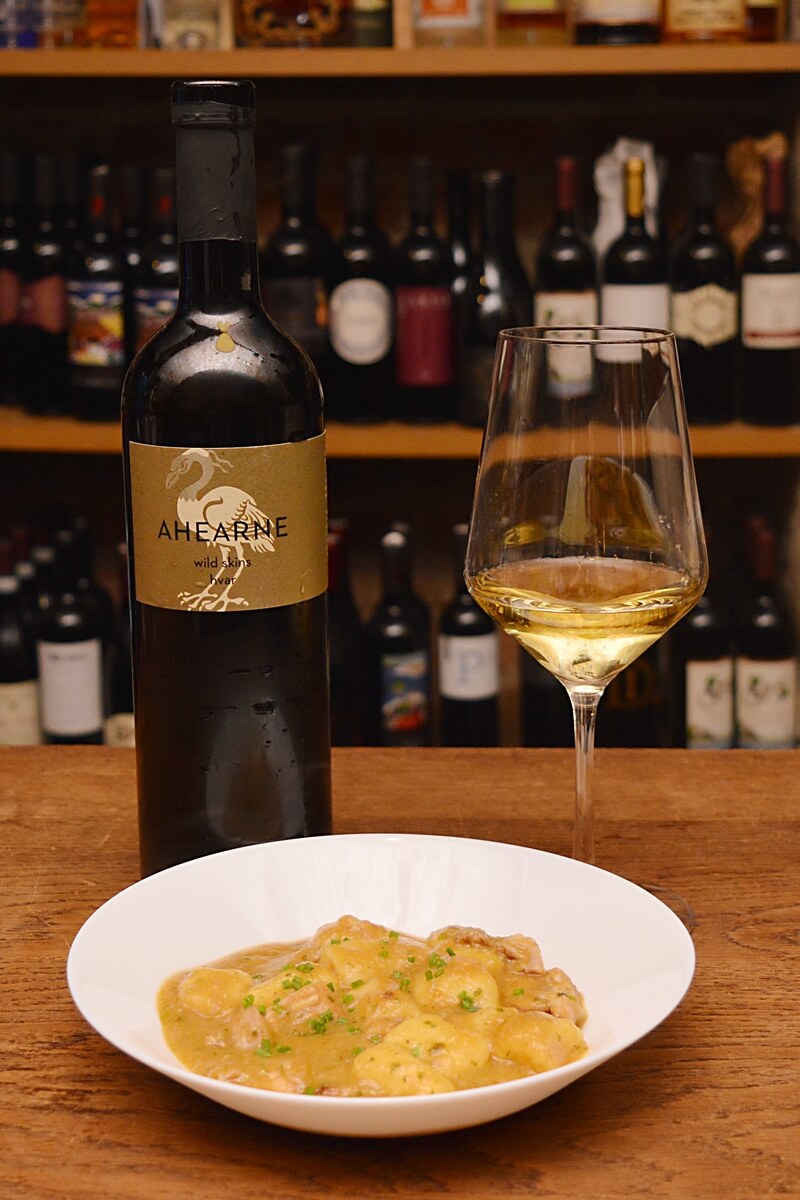
The 2014 Plavac Mali presented Dalmatia in a slightly different light. By ageing in oak barrels from Burgundy in France, the wine demonstrated the freshness and lively fruitiness of ripe plums, with pronounced herbal notes and traces of dark chocolate. Lamb chopsticks and browned polenta from the Fino Vino restaurant received the compliments from the audience, and together with Plavac Mali, they were the best pairing of the evening.
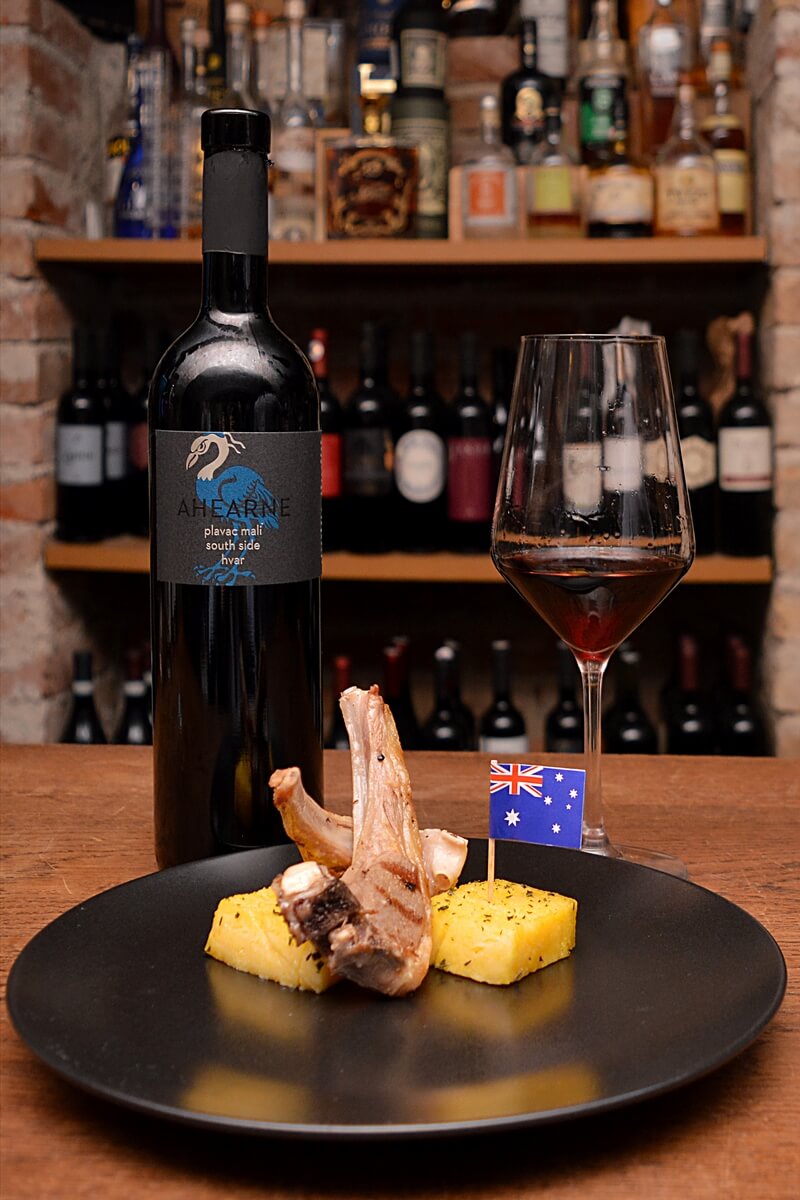
The event ended with The Footbolt Shiraz 2016, a typical representative of the Australian Shiraz. Plum and blackberry fruits could be felt in it, with a spicy aroma at the end, paired with the “icing on the cake” – a dessert in the form of a roll called the Pavlova (cake), made by the Australian Embassy’s chef.
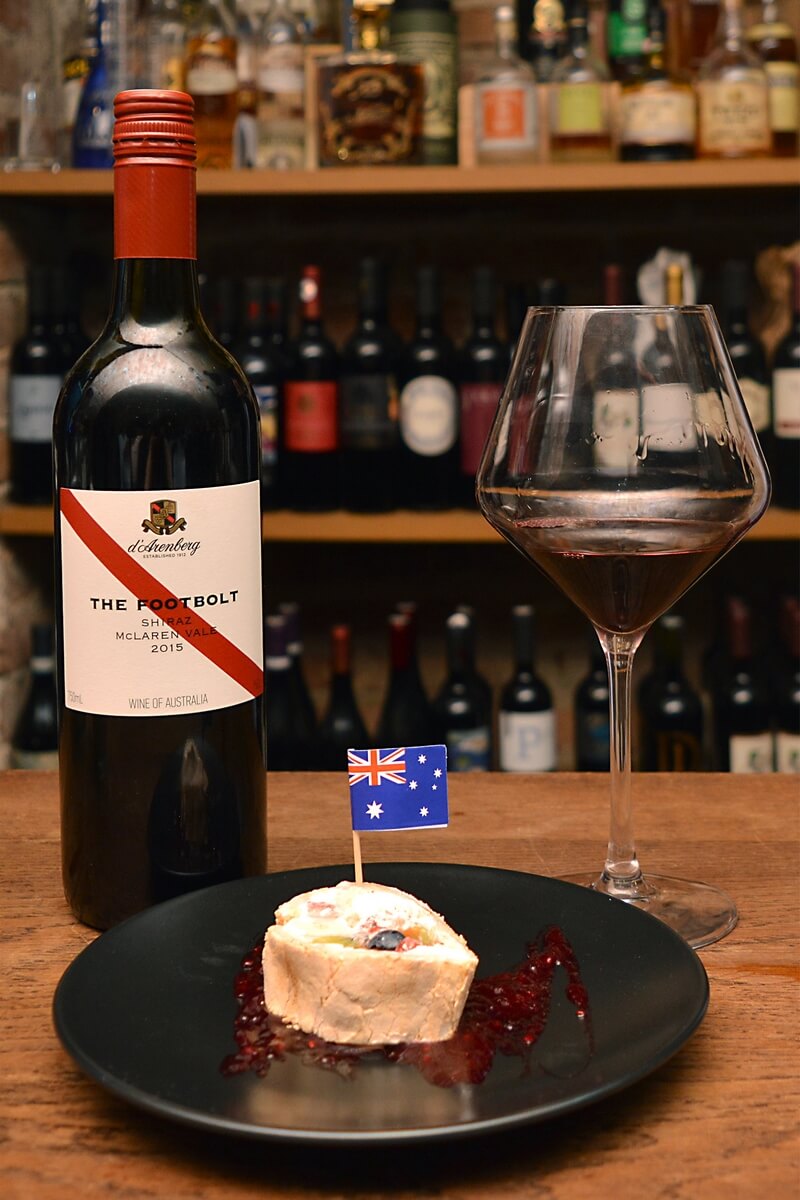
It was a memorable evening and a fascinating and positive mix of different continents, cultures and tastes.
More food and wine news can be found in the Lifestyle section.
Photos by: Silvija Munda
Australian Police Arrest Man Who Sent Suspicious Parcel to Croatian Consulate
ZAGREB, January 10, 2019 - Australian police said on Thursday they had arrested a man for allegedly sending suspicious packages to embassies and consulates across the country, Reuters news agency reported.
The 48-year-old is suspected of sending as many as 38 packages to 14 embassies and consulates, including the US, British and Croatian missions in Melbourne. If found guilty, he faces up to 10 years in jail.
The Croatian consulate in Melbourne received a package in the regular mail on Wednesday, containing three little packets. Staff called the firemen and federal police, who took the items away, but there was no need for the consulate to be evacuated.
According to media reports, some of the parcels contained asbestos, a material used in construction that can cause health problems.
More news on the relations between Croatia and Australia can be found in our Politics section.
Croatian Consulate in Melbourne Receives Suspicious Package
ZAGREB, January 9, 2019 - The Croatian consulate in Melbourne is among the diplomatic offices which have confirmed receiving a suspicious package on Wednesday, CNN said.
Joseph Petrić, Consulate General of the Republic of Croatia in Melbourne, told CNN that a package arrived at the consulate in the regular mail, and contained three little packets. Staff called the firemen and federal police, and the authorities came, packaged it and took it away. He said the office was not evacuated.
Croatia's Foreign Ministry could not confirm that the Croatian consulate was one of them by phone because it replies only to written queries.
The Australian Federal Police (AFP) confirmed that police and emergency services had responded to suspicious packages sent to embassies and consulates in both Canberra and Melbourne but did not provide details as to the specific locations or contents of the packages. "The packages are being examined by attending emergency services. The circumstances are being investigated," said the AFP statement.
Australian media have reported that packages had been sent to a total of 14 diplomatic offices, including the British, American, Indian, Pakistani, French, South Korean, Greek, Swiss consulates in Melbourne.
According to the media, some of the packages contain asbestos, material used in construction which can cause health problems.
More news on the relations between Croatia and Australia can be found in our Politics section.
More Australians Visiting Croatia
ZAGREB, September 2, 2018 - Australia's tourism market is more and more interested in cooperation with Croatian partners and the number of Australian visitors is growing, particularly in Zagreb and Dubrovnik, directors of the two cities' tourist boards have said.
Croatian-Australian Painter Donates Works to Rijeka Museum to Start Diaspora Collection
The Australian painter of Croatian origin was born in Istria.
Croatian Franchise Surf'n'Fries Coming to Australia’s Bondi Beach
The global expansion of the Croatian franchise continues.


